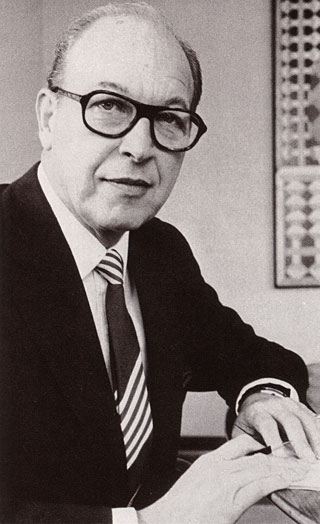
 |
Search | FAQ | US Titles | UK Titles | Memories | VaporWare | Digest | |||||||
| GuestBook | Classified | Chat | Products | Featured | Technical | Museum | ||||||||
| Downloads | Production | Fanfares | Music | Misc | Related | Contact | ||||||||
| Memories of VideoDisc - Who's Who in VideoDisc | ||||||||||||||

Robert Sarnoff, son of long-term RCA head David Sarnoff was born in New York City on July 2, 1918. He received a BA from Harvard University in 1939 and a law degree from Columbia University in 1940. Between degrees he spent the summer working in the RCA Pavilion at the 1939 World's Fair. During World War II he obtained a naval commission, was in several Pacific theater battles, and late in the war was a liaison in Washington, D.C. Following the war he went to work at Look magazine, and in 1948 joined RCA-subsidiary NBC as a sales account executive.
During the next few years he worked in a variety of jobs at NBC, most notably in 1952, as coordinator for the documentary series Victory at Sea (partially available on CED), before reaching the presidency at NBC in 1955. In 1966 he assumed the presidency of RCA. He became Chief Executive Officer in 1968 and Chairman of the RCA Board in 1970. During his tenure at RCA, Robert Sarnoff is perhaps best remembered for his diversification of RCA into other business ventures with the acquisition of Random House (books), Hertz (rental cars), Banquet (frozen foods), Cushman & Wakefield (real-estate brokers), and Coronet (carpeting).
Robert Sarnoff married Metropolitan Opera diva Anna Moffo in 1974, and in the view of other members of the RCA Board, he was spending too much time on cultural activities rather than on the financial difficulties plaguing the corporation in 1975. While accompanying his wife on a three week concert tour of the Far East in October 1975, the Board voted to oust Robert Sarnoff as CEO and Chairman of the Board. The decision was announced on November 5, 1975. Sarnoff immediately resigned as CEO, and stepped down as Chairman on December 31, 1975. He was replaced by Anthony Conrad, who had been President of the Corporation since 1971. After his ouster from RCA, Bob Sarnoff went into semi-retirement and passed away on February 22, 1997 at the age of 78.
Robert Sarnoff, eldest son of broadcasting mogul David Sarnoff, followed in his father's professional footsteps throughout his career at NBC and the Radio Corporation of America (RCA). Contemporaries attributed Robert's corporate promotions to nepotism, and constantly drew comparisons between his executive performance and style and that of his father. During his years as company head, Robert practiced decision-making by consensus, displayed an obsession with corporate efficiency, and constantly sought to implement modern management techniques. David's aggressive, imperial, dynamic manner of command often overshadowed his son's practical, yet increasingly mercurial, character.
After a short stint in the magazine business, Robert Sarnoff joined NBC as an accounts executive in 1948--at a time when David Sarnoff had recently assumed chairmanship of electronics giant RCA, the parent company of NBC. Robert served in a variety of positions over the next few years, working his way up the business ladder. As vice president of NBC's film unit he oversaw the development of Project XX and Victory At Sea--the latter a pioneer in the documentary series format that traced the naval campaigns of the World War II through compilation footage. Passing as educational programming, the series was well attuned to Cold War patriotism and earned Sarnoff a Distinguished Public Service Award from the U.S. Navy.
NBC television programming strategies during the first half of the 1950s were largely determined by the flamboyant Pat Weaver. RCA funded Weaver's extravagant experiments in the medium since it wished to establish NBC's reputation as a "quality" network and was realizing a return on its investment through increased sales of television receivers. By mid-decade, however, RCA policy was modified: NBC was now expected to achieve economic self-sufficiency and advertising sales parity with arch-rival CBS. Weaver was first promoted to NBC chair in 1955, and then forced to resign from the company several months later. In turn, Robert Sarnoff ascended to fill both vacant positions.
Sarnoff assumed leadership of the network's financial interests and general policy decisions. Robert Kintner, who had shown a propensity for budget-conscious scheduling at ABC, took over as head of NBC-TV programming and was elevated to the rank of NBC president in 1958. Together, the "Bob and Bob Show" (as it was known in the industry) stabilized network operations and routinized programming. Sarnoff established a clear chain of command by streamlining NBC's staff, increasing middle management positions, and delegating more operating responsibilities to department heads. In order to cut overheads, in-house production was curtailed, and links with several dependable suppliers of filmed programming were created. Program development and series renewal became subject to ratings success and spot advertising sales. Towards the end of the decade, westerns, action shows, sitcoms, and quiz shows were regular prime time features. Gone, for the most part, were the costly "spectaculars" and live dramas of the Weaver years. NBC profits improved steadily.
Sarnoff's most public phase came in the late 1950s and early 1960s when he defended NBC programming policies against critics in the press and in Congress. The public interest was best served by popular programming, Sarnoff's reasoning went. He espoused the benefits of a "well-rounded schedule," but clearly practiced a policy of programming to majority tastes. Sarnoff insisted that competition for advertisers, audiences, and affiliate clearance would ensure that the networks would remain receptive to the multiple demands of the market. Ratings were the economic lifeblood of the medium; "high brow" interests would have to remain secondary to "mass appeal" shows in the NBC schedule. Critics who lamented the disappearance of "cultural" programming were elitist, he claimed. Neither the Federal Communications Commission nor Congress should interfere in network operations or establish program guidelines, according to Sarnoff, since this would encourage political maneuvering and obstruct market forces. More effective industry self-regulation and self-promotion, spear-headed by the networks, would ensure that recent broadcasting transgressions (symbolized by the quiz show scandals and debates over violence on television) would not reoccur.
Sarnoff's agenda did not dismiss "public service" programming entirely. Kintner had turned NBC's news department into a commercially viable operation, most notably with the Huntley-Brinkley Report. During these years, NBC undertook various educational projects, including Continental Classroom (the first network program designed to provide classes for college credit) and several programs on art history (a particular passion of Sarnoff). Sarnoff extolled television's ability to enlighten through its capacity to channel and process the diverse fields of information, knowledge, and experience that characterized the modern age. He touted television's ability to generate greater viewer insight into the political process, and is credited with bringing about the televised "Great Debates" between Kennedy and Nixon during the 1960 presidential campaign.
In general, NBC's public service record during the Sarnoff years was disappointing. NBC did, however, become a serious ratings and billings competitor to CBS. In marked contrast to the dismal results of the previous decade, the network's color programming in the 1960s helped to dramatically boost color set sales--and, consequently, RCA coffers.
On the first day of 1966, again thanks largely to his father's influence, Robert Sarnoff became President of RCA. Two years later he assumed also the role of chief executive officer. David Sarnoff remained chairman of the board until 1970, when ill health forced him to relinquish that position to his son. At RCA Robert inherited, and exacerbated, problematic developments that would result in his forced resignation in 1975. The younger Sarnoff continued to diversify the corporation, but with some ill-chosen investments that yielded poor returns. Most significantly, he over-committed company resources to an abortive attempt to achieve competitiveness in the mainframe computer market. During Sarnoff's tumultuous time at RCA he continued to oversee operations at NBC. There he found little solace, as the network lost ground to CBS and ABC in the early 1970s. NBC's weakened performance contributed to declining RCA stock prices--a state of affairs that resulted in Robert's displacement from the company that had become synonymous with the Sarnoff name over the previous half century.
- The Encyclopedia of Television (1997 edition)
Robert W. Sarnoff, who succeeded his father as chairman of the RCA Corporation and steered it into a hodgepodge of new businesses before being removed more than 20 years ago in a "palace revolt," died yesterday at Lenox Hill Hospital. He was 78 and lived in Manhattan. His wife, the opera soprano Anna Moffo, said the cause was cancer, a disease he had battled for 16 years.
- February 23, 1997 New York Times
Listen to Bob Sarnoff's 1973 comments on Lum Fong - RCA's first successful VideoDisc.
If you have some additional information to supply on Robert William Sarnoff, feel free to submit the form below, so your comments can be added to this page.
Send your comments in email via the Contact page